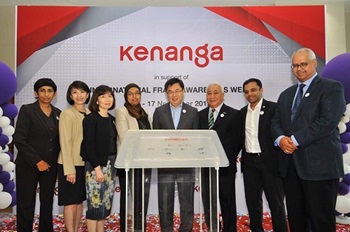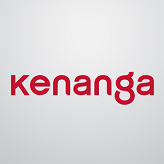Featured Partner: Kenanga Investment Bank Berhad
Financial institutions worldwide have seen an increase in fraud cases over the years thanks to advancing technology and creativity from fraudsters. That said, Maheswari Kanniah, CFE, group chief regulatory and compliance officer, believes their staff’s vigilance and alertness have made the difference to help Kenanga Investment Bank Berhad stay one step ahead in the fraud game. Ms. Kanniah who has been in the financial industry for the past 39 years, the last seven of which with Kenanga, commented before joining the Corporate Alliance that Kenanga had adopted policies and procedures for the reporting of incidences of fraud and that approach in itself is insufficient to address the latest fraud techniques. Today, Ms. Kanniah is proud to have taken the proactive approach instead, as they are “on track to prevent, detect and mitigate fraud.”
Based in Malaysia, Kenanga is a financial group with more than 40 years of established experience in equity brokering, investment banking, futures broking, treasury, corporate advisory, Islamic banking, wealth management and investment management. According to Ms. Kanniah, joining the Corporate Alliance in 2015 “denotes Kenanga’s commitment to the fight against fraud through employee training and educational opportunities.” As an active partner, she also believes that it is important to set the tone from the top and ensure the organization practices a zero-tolerance policy toward fraud.
Kenanga seeks to become a catalyst in humanizing the anti-fraud agenda in the Malaysian business domain.Maheswari Kanniah, Kenanga
Occupation:
Group Chief Regulatory and Compliance Officer
Industry:
Financial
Location:
Malaysia
 Seeing fraud as an ever-changing subject matter, Kenanga continually assesses its management information systems to ensure they adequately keep pace with complex businesses and transactions, as well as advanced technology. “Every time a fraud happens and we put in measures to prevent such frauds, the fraudsters learn from that and design another channel to perpetrate the same fraud – this has always been the concern. The whole industry is always playing catch-up as the sharing of information through the network of fraudsters is much quicker and real-time than the sharing of information within the regulators and industry. Ms. Kanniah adds, “By the time we know that we have been hit and are able to identify what actually hit us, millions of dollars would already have been out of the system!”
Seeing fraud as an ever-changing subject matter, Kenanga continually assesses its management information systems to ensure they adequately keep pace with complex businesses and transactions, as well as advanced technology. “Every time a fraud happens and we put in measures to prevent such frauds, the fraudsters learn from that and design another channel to perpetrate the same fraud – this has always been the concern. The whole industry is always playing catch-up as the sharing of information through the network of fraudsters is much quicker and real-time than the sharing of information within the regulators and industry. Ms. Kanniah adds, “By the time we know that we have been hit and are able to identify what actually hit us, millions of dollars would already have been out of the system!” Corporate Alliance members have the opportunity multiple times per year to meet with anti-fraud peers through private, member-only networks and roundtable discussions to share best practices. These meetups “facilitate learning, networking and knowledge sharing among anti-fraud professionals from different organizations and industries around the world toward supporting the implementation of anti-fraud best practices,” says Mrs. Kanniah. When asked to explain the value of collaborating with other organizations participating in the Corporate Alliance, Ms. Kanniah responds, “Although fraud nomenclature is ancient, not a single individual or institution could claim expertise on all aspects of the subject matter.” Ms. Kanniah believes that through the Corporate Alliance partnership, Kenanga learns from fellow partners by obtaining updates and insights on similar incidences occurring within the financial domain.
We believe that the tone from the top is essential in driving the message across. If the senior management doesn’t walk the talk, then convincing the middle managers and staff below may be a problem.Maheswari Kanniah, Kenanga
Occupation:
Group Chief Regulatory and Compliance Officer
Industry:
Financial
Location:
Malaysia
 In turn, Kenanga’s anti-fraud team is comprised of various department representatives and is not confined to just the compliance personnel within the organization. It is clear that the bank takes the stand that compliance is every employees’ responsibility, not only the involved parties who manage fraud. She emphasizes that “business units are the first layers to face fraudsters or be the target; hence, their active participation in the fight against fraud should be encouraged. They are the frontiers for the organization, i.e., the great wall who face the fraudsters in their everyday dealing with clients, vendors and other third parties.” Ms. Kanniah strongly believes that front-line employees should be the first to be trained on the identification of red flags, preparing them to fight fraud from every angle.
In turn, Kenanga’s anti-fraud team is comprised of various department representatives and is not confined to just the compliance personnel within the organization. It is clear that the bank takes the stand that compliance is every employees’ responsibility, not only the involved parties who manage fraud. She emphasizes that “business units are the first layers to face fraudsters or be the target; hence, their active participation in the fight against fraud should be encouraged. They are the frontiers for the organization, i.e., the great wall who face the fraudsters in their everyday dealing with clients, vendors and other third parties.” Ms. Kanniah strongly believes that front-line employees should be the first to be trained on the identification of red flags, preparing them to fight fraud from every angle. Kenanga developed three main policies involving a broad range of employees from different departments: A group code of conduct and ethics policy, a group anti-fraud bribery and corruption policy, a group fraud reporting policy and a group conflict management policy. These policies set out behavioral expectations for Kenanga employees when carrying out activities toward setting a common standard of practices across the company. The company’s next plan of action is to develop a procedure comprising the fraud risk management guide framework, applying a risk-based approach in detecting and mitigating instances of fraud. Ms. Kanniah explains that the Corporate Alliance has broadened the spectrum of knowledge related to fraud occurrences, thus allowing Kenanga to be equipped in the development of these tools.
Business units are the first layers to face fraudsters or be the target; hence, their active participation in the fight against fraud should be encouraged. They are the frontiers for the organization.Maheswari Kanniah, Kenanga
Occupation:
Group Chief Regulatory and Compliance Officer
Industry:
Financial
Location:
Malaysia
A whistle-blowing framework is also in place for employees to raise any concerns or suspicion of fraud, safeguarding confidentiality in the process of reporting fraud. Ms. Kanniah says having these policies in place creates an avenue for employees and stakeholders to lodge non-compliances and abuses, effectively creating a “perception of detection.” Kenanga has rewarded proactive parties who have been instrumental in the detection and prevention of potential fraud cases in an effort to incentivize alertness to fraud.
With an increase in cybercrime in today’s world, Kenanga recognizes that the threat cannot be fought alone and thinks that a collaboration of reputable IT security vendors furnishing surveillance services on a real-time basis for critical systems is a must. In recognition of this need, a Security Incident and Event Management (SIEM) system has been put in place which assists in the mitigation of cyber threats while enabling businesses to focus on growing instead of spending too many resources in an area that is not their expertise. Ms. Kanniah notes that organizations who cannot afford such systems should at the very least have their own Security Operations Center (SOC) to supervise their site using data processing technology.
In addition to their many proactive policies and procedures in place, along with efforts to educate their employees regularly, Kenanga stands out as an exemplary organization for involving their teams on fraud-related matters regularly. For example, the Association of Certified Fraud Examiners (ACFE) holds an annual International Fraud Awareness Week every November, and Kenanga has extended the event to six consecutive weeks of fraud awareness exercises. Ms. Kanniah states that “the normal classroom approach is so conventional and boring and has no deep learning effect.” Kenanga takes initiative to make learning about fraud a fun and exciting activity for their employees. Their objective is to humanize learning in a way that will appeal to everyone’s senses.
 This year, Kenanga kicked off their Fraud Awareness Week with senior management walking around to various departments to ask fraud-related questions, starting with more basic questions and building to more challenging questions at the end of week one, leading up to the “finals.” This exercise stimulates friendly competition through fraud-related games and activities lined up over several weeks while serving as an opportunity for upper management to leverage increased face time with employees.
This year, Kenanga kicked off their Fraud Awareness Week with senior management walking around to various departments to ask fraud-related questions, starting with more basic questions and building to more challenging questions at the end of week one, leading up to the “finals.” This exercise stimulates friendly competition through fraud-related games and activities lined up over several weeks while serving as an opportunity for upper management to leverage increased face time with employees.
“Apart from emphasizing Kenanga’s zero tolerance policy on fraud in all its business dealings and activities, it is also hoped that prolonging [learning] events may deepen the impact of embedding the fight against fraud as part of an individual’s self-realization, thus enhancing Kenanga’s corporate culture,” Ms. Kanniah expresses. After 40 years, and with the future in its sight, Kenanga aims to initiate discussions among financial industry participants on the long-term importance of fraud prevention to society. At the end of the day, every organization should strive toward Kenanga’s admirable goal — building a team of proactive anti-fraud professionals.

